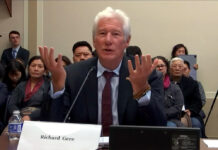(TibetanReview.net, May22’21) – China has described as success its efforts to drive the Tibetan people away from religion to become more material-oriented and therefore compatible with its socialist system, leading to progress in Tibet’s development. In other words, Beijing says its policies in Tibet of severely restricting religious freedom, ethnic assimilation, political persecution, suppression of human rights, massive investments to plunder its natural resources, and encouragement of Chinese immigration over the last 70 years or so has been a resounding success.
“More and more believers have been trained from pursuing a good afterlife to living a good life in this life, and religion has been increasingly compatible with a socialist society,” bloombergquint.com May 22 quoted Wu Yingjie, the Communist Party chief of Tibet Autonomous Region (TAR), as saying at a press briefing in Beijing May 22.
Wu has also listed a wide array of ways the Chinese occupation rule had transformed the region where most people are Buddhist — from building schools and paved roads to improvements in health care — ahead of the marking on May 23 of the 70th anniversary of China’s annexation of Tibet.
Both Wu and the TAR’s Governor Qi Zhala have sung their praises of the Chinese government’s efforts to provide education for Tibetans. What they have not mentioned was that the education system and curricula were designed to Sinicize the Tibetan people under President Xi Jinping’s ongoing Sinicization campaign.
“Almost all the best buildings are schools,” Wu has said. “Fair and equitable education is taken very seriously by the government at all levels. There is a lot of funding and input.”
Wu has also emphasized the importance of Chinese culture by saying it “has all along provided a sentimental bond and a sense of belonging for all ethnic groups” in the TAR.
“Tibetan Buddhism is an important part of Chinese culture, and Tibetan cultures are important components of the Chinese culture,” he has said, underlying the predominant importance of the Chinese culture, which is what the ongoing Sinicization campaign is all about.
Neither Wu nor Qi have taken questions from Bloomberg News at the briefing, one of several held by Communist Party officials as President Xi prepared to celebrate the ruling party’s 100th anniversary in July, the report said.






